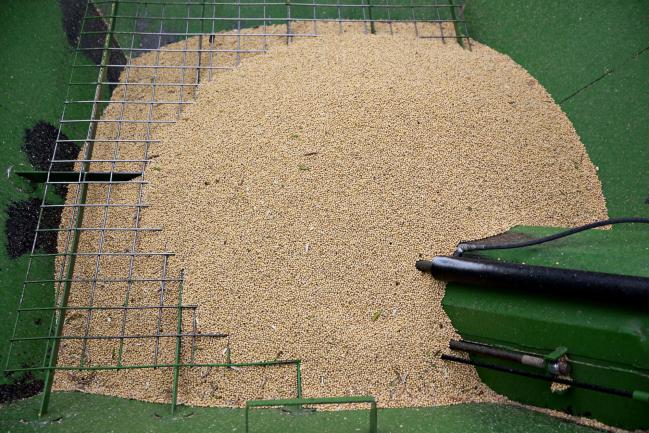(Bloomberg) -- When it comes to Chinese purchases of U.S. agricultural goods, signs are growing that President Donald Trump won’t get what he wants anytime soon.
Trump complained Thursday that China hasn’t boosted its purchases of U.S. farm products, a promise he claims he secured in a meeting with his counterpart Xi Jinping in June. But according to officials in Beijing familiar with the talks, no such agreement was made. China’s Commerce Ministry yesterday also indicated that in their view, substantial discussions have yet to restart even though both sides spoke on the phone.
China has started preparing to buy farm products, including gauging the prices of U.S. soybeans, but will not purchase large amounts until it sees concrete progress in the negotiations, a person familiar with the matter said Friday. Small purchases could happen before that, the person said.
Trump and Xi agreed to a tentative pause in raising tariffs after their meeting in Osaka, though varying readouts and vague comments from Trump have sown confusion about what was actually agreed on in the room. Major sticking points include when and by how much China will increase its imports of U.S. farm products, and how exactly the U.S. will ease trade restrictions on Chinese technology giant Huawei Technologies Co.
China’s stance so far suggests that “the purchase of agricultural products is pegged to the entire deal being done,” said He Weiwen, a former commerce ministry official who is now a senior research fellow at the Center for China and Globalization in Beijing. “It is not a case that China buys American products first to get a final deal, but rather that after a final deal is inked, China will make the purchases it agreed to.”
China has rejected a U.S. demand to increase agricultural purchases beyond the number Trump and Xi agreed to in Argentina last year, according to Wang Huiyao, an adviser to China’s cabinet. He was speaking after the June summit.
U.S. Department of Agriculture data indicate that China actually slowed its purchases of American agriculture products following the Osaka meeting. The nation bought 127,800 metric tons of U.S. soybeans last week, a 79% reduction from the previous week. Similarly, China bought just 76 tons of American pork, compared to 10,400 tons in June.
Hu Xijin, editor-in-chief of the state-owned Global Times newspaper, tweeted late Thursday that the “achievement of Osaka summit is a China-U.S. consensus, not a unilateral commitment China made to the U.S. Hope the U.S. will lift all sanctions on Huawei soon and respect the principle of equality.”
Huawei Reprieve
Last week, an influential Chinese agricultural researcher said it’s unlikely Beijing will start purchasing large amounts of U.S. products anytime soon. Barriers include tit-for-tat tariffs that remain in place, as well as tensions over Huawei, according to Li Qiang, chairman and chief analyst at Shanghai JC Intelligence Co.
“The trade teams in the two nations will restart trade negotiations on a basis of equality and mutual respect, following the consensus agreed by their two state leaders in Osaka,” Gao Feng, a spokesman for the Ministry of Commerce, said on Thursday at a regular briefing. Gao didn’t say when the negotiations would be held, but said he hoped the U.S. would implement its commitments with regards to Huawei.
When questioned last week about Trump’s claim in Japan that China had agreed to buy “tremendous” amounts of U.S. farm goods, Gao said that the two nations had large room to cooperate on agriculture, and hoped that a solution could be reached on the basis of equality.
“It seems the two sides are arm-wrestling about the basis on which they’ll resume talks, as well as when and where,” said Zhou Xiaoming, a former commerce ministry official and diplomat. “The U.S. shouldn’t expect that the text agreed before May will automatically become the basis for the new round of trade talks.”
